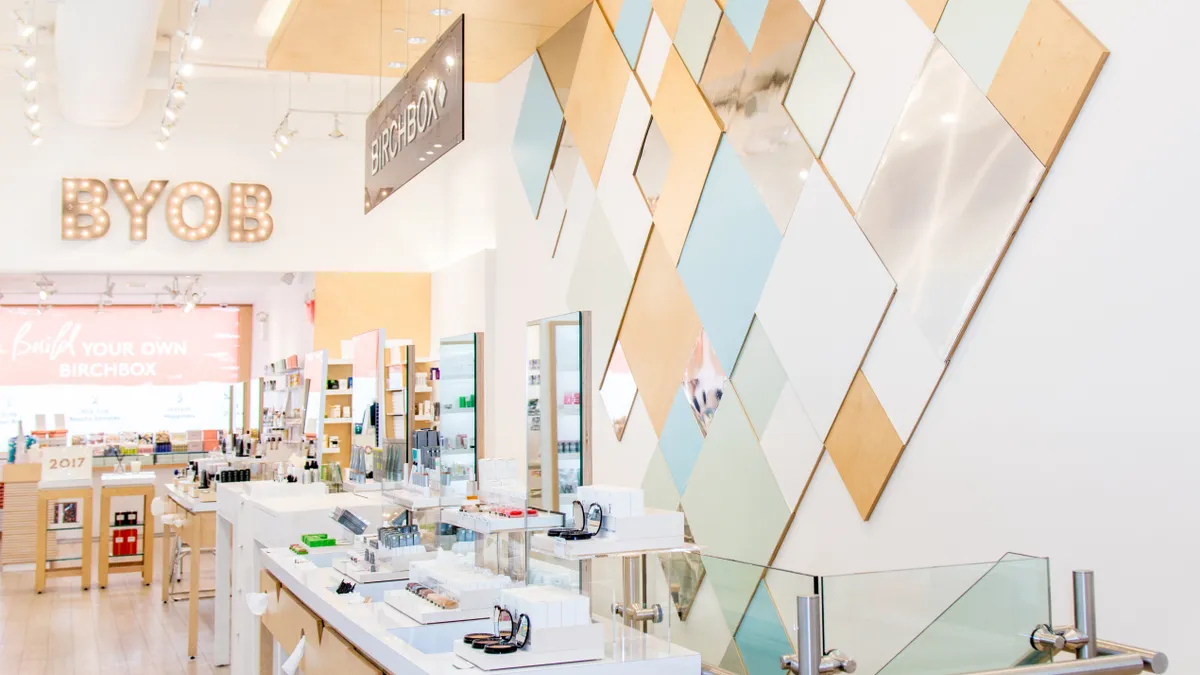While Birchbox may have risen to popularity thanks to its subscription service of beauty samples, which emphasizes product discovery, the company is changing its focus to include the healthcare space at large as it moves under startup FemTec Health.
The beauty company was acquired by FemTec Health, a women's health sciences and beauty company, for upwards of $45 million.
With the acquisition, Birchbox will relaunch later this year with a new focus on personalized skin and healthcare products, a shift from its original focus on product discovery through beauty samples. Katia Beauchamp, founder and CEO of Birchbox, will become a strategic adviser at the company and sell her remaining stake in the company.
FemTec Health was founded in May last year and just launched publicly this month, with the aim of transforming "the total healthcare experience for women" using tech and data. For Birchbox, that means a broader assortment of products than its core offering and an emphasis on personalization. According to Beauchamp, the vision is to include things like topical beauty and ingestible beauty, as well as other potential links to wellness, while still allowing for a product discovery experience.
The subscription model "will continue to be a core aspect of Birchbox," Beauchamp said, but the companies are "reimagining" what type of products are included in the subscription.
Whether that means using data to pair customers with existing products or design its own products for customers is not set in stone yet. FemTec Chief Scientific Officer Kim Capone responded that "the world is our oyster" in regards to those options, though FemTec is currently developing its own line of wellness and personal care products that will come out next year. Those items will "coordinate very nicely with the acquisitions, in particular with Birchbox," Capone said.
"We're also building another direct-to-consumer brand that's very much focused on this healthcare offering … The idea is to bring your healthcare that's currently very fragmented — for example, fertility, menopause, sexual wellness offerings, exist amongst a number of different brands — the idea is to bring it together in a very clear, cohesive manner, so that a woman can come to one place and find the solutions to her needs," Capone said. "And bring these solutions, or at least some of them, into this beauty space where they're relevant and cross- pollinate if you will, for women to understand beauty and the health aspects of beauty.
Changes to Birchbox to reflect the broader focus will start soon and continue rolling out through 2022. Birchbox's owned brands could still show up in its boxes as well. Capone said FemTec was considering how to build out those private labels and offer more scientific value through them.
"We're not trying to leave beauty at all, but we're trying to reimagine the potential of thinking about beauty," Beauchamp said. "We want there to be a sense that this is about efficacy. This is about really improving your health and your wellness."
"We never started Birchbox to be a sampling business."

Katia Beauchamp
Founder of Birchbox
Birchbox had already been thinking about a move in the direction of "beauty health" before the acquisition, according to Beauchamp, including through supplements and products "related to the psyche." It's not the only one — Ulta executives just last week outlined a vision for an "expanded view of beauty" that included more emphasis on wellness, including supplements and down there care. FemTec had a similar vision, and while Birchbox wasn't looking for an acquirer at that point, the extra financial support didn't hurt.
"I think that after the pandemic year, which was just a lot of changes and uncertainty, we definitely were excited by the fact that FemTec wasn't just a big vision, but it was going to be a really well-financed vision," Beauchamp said.
Birchbox in February last year laid off 25% of its global staff, including almost half of the employees at its New York corporate offices, and raised prices in 2019 due to higher costs.
Beauchamp doesn't see the acquisition as a pivot or a departure from its beginnings, but rather a "natural evolution" to address a beauty space that has grown more confusing.
"We never started Birchbox to be a sampling business," Beauchamp said. "We really thought about the pain point in consumers of finding the right products. … Do we feel like we're getting the most out of them? And sampling was this opportunity to transform the path to purchase — and that isn't really going away."
For FemTec's Capone, connecting healthcare and beauty allows the company to take advantage of the relationship beauty brands have with their customers and extend that into healthcare to drive a more full understanding of the wellness space in general.
"The reality is that the healthcare industry does not understand women as well as the beauty care industry does," Capone said. "And so if we bring them together, we can really help women understand this entire space and drive wellness for themselves."
























